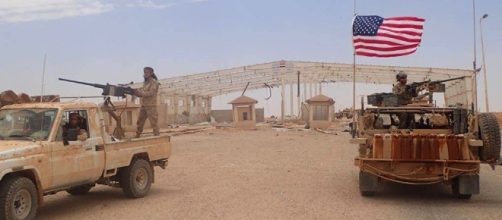Assad's govt forces managed to secure Al-Dolei'yat, a town near the Iraqi border on Monday. The city holds an oil pipeline that runs from the T3 pumping station near Palmyra to the T2 station in Deir Ezzor, a border town near Iraq. The news of the victory was relayed to Syrian President Bashar Al-Assad to his delight.
What is the goal of Syria's advanced towards the Iraqi border?
According to Military sources, the objective of the Syrian government is the capture of the town of Abu-Kamal near the Iraqi border. This town is important due to its strategic location and its airfield, which will be of use to both Syria and Russia.
Assad's forces faced light resistance from ISIS stragglers and a few bands of Free Syrian Army rebels in the area around the town. The FSA is one the rebel groups supported by the United States, along with the Syrian Democratic Force (SDF), which is now attacking Raqqa. It has been known that the FSA tried on multiple occasions to capture Abu-Kamal and its airfield to no avail.
The Deir Ezzor region is a major corridor that lines the Iraqi border, which is crucial for the success of the Syrian rebels. With Assad controlling this area, coalition forces in Al-Tanf and the Kurdish troops attacking Raqqa are split. The U.S. military hoped to control the desert lining the Iraqi border to connect the northern Kurds, the Syrian rebels in Al-Tanf in the south and the Iraqi forces from the East.
However, Assad's government forces have driven a wedge right in the middle of the Eastern Syrian desert. This will effectively hamper any form of a concerted effort by all U.S. coalition members in Syria.
How will the coalition react to Assad's growing power in Syria?
Currently, the U.S. led coalition is stalled at Raqqa as ISIS fighters have deeply entrenched themselves in multiple sectors inside the city. The advance of Kurdish fighters is slowed down by the hit and run tactics of jihadist troops inside Raqqa and bitter house to house fighting. U.S. air strikes are also hampered due to the continued interference of Syrian forces that can lead to more diplomatic problems. In the last two weeks, the U.S.
air force has shot down two Syrian aircrafts near Raqqa.
The United States has tried to advance through the eastern desert as fast as possible, but Assad's government forces tore through ISIS territory and managed to gain more ground. American troops in Syria will be in a very difficult situation after ISIS is defeated as Russia will be the foremost protector of Syria. If the U.S. wants to support the rebels in Syria continually, they will most likely have to face the might of Russia as well.


